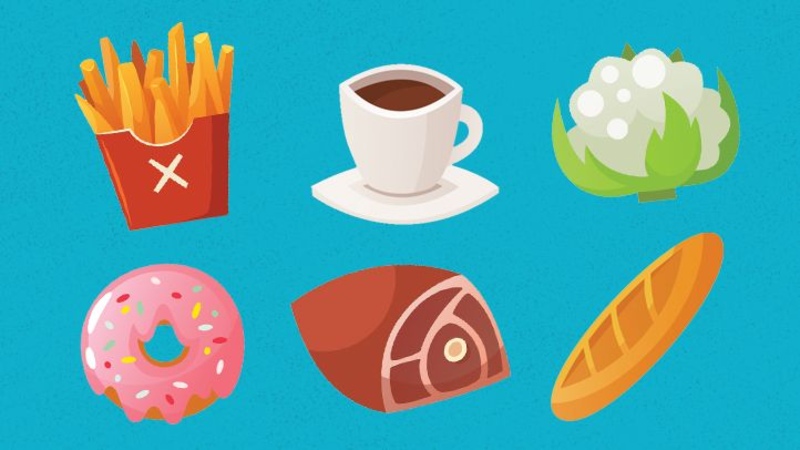Navigating Thyroid Health through Diet
Dec 15, 2023 By Nancy Miller
The thyroid gland's insufficient production of crucial hormones characterizes hypothyroidism, a condition that necessitates meticulous dietary considerations. A proper diet for hypothyroidism can significantly enhance both thyroid function and overall well-being. A strategic approach to nutrition is essential for individuals living with hypothyroidism. In this article, we shall delve into indispensable aspects of a hypothyroidism diet, our primary focus will be on identifying foods that should be avoided.
Cruciferous Vegetables - A Balancing Act
Broccoli, cabbage, Brussels sprouts, and all cruciferous vegetables teem with an abundance of nutrients. These include vitamins, minerals, and antioxidants to be precise.
Their consumption however requires a delicate balance for individuals dealing with hypothyroidism. Excessive intake of these vegetables might interfere with thyroid function due to the presence of goitrogenic compounds within them.
Goitrogens, by blocking the thyroid glands’ uptake of iodine, potentially disrupt thyroid hormone synthesis. Iodine plays a crucial role in producing these hormones. Thus, an imbalance may cause thyroid dysfunction. Individuals with hypothyroidism should moderate their consumption of cruciferous vegetables meticulously.
Instead of completely avoiding these nutrient-rich vegetables, contemplate cooking them. The process reduces goitrogenic compounds. By steaming or boiling cruciferous vegetables, an approach that maintains their nutritional value and makes them gentler on the thyroid, you can strike a balance, incorporating these beneficial greens into your diet without sacrificing thyroid health.
Soy Products - Impact on Thyroid Hormones
Versatile and widely consumed, soy also harbors goitrogens. These are compounds that potentially disrupt thyroid hormone production. Consequently, individuals with hypothyroidism must vigilantly monitor their intake of soy. It is an imperative action for maintaining optimal health.
Soy milk, tofu, and processed soy products, all based on soy, can potentially introduce goitrogens into your diet. While offering diverse health benefits. Individuals with hypothyroidism should exercise caution in their consumption of soy. Choose alternative sources for protein and dairy. Opt for lean meats, select fish over red meat, and also consider dairy products without any added soy additives.
Those who rely on thyroid medication should particularly prioritize vigilance in managing their soy intake, as goitrogens may potentially compromise the effectiveness of the prescribed drugs. Individuals with hypothyroidism can enhance their condition management and promote thyroid health by exercising informed choices and regulating their consumption of soy.
Gluten and Hypothyroidism - Unraveling the Connection
Recent studies have delved into the potential correlation between autoimmune thyroid conditions, particularly hypothyroidism, and gluten intolerance. In susceptible individuals, the protein gluten, which is present in wheat, barley, and rye, may trigger inflammation and provoke autoimmune reactions.
Individuals with hypothyroidism, particularly those suffering from autoimmune thyroid disorders such as Hashimoto's thyroiditis, may find a gluten-free diet beneficial. Opting for nutritious alternatives like quinoa, rice, and buckwheat which also eliminate potential triggers for thyroid-related inflammation could serve as an effective approach.
Under the guidance of a healthcare professional or registered dietitian, one should adopt a gluten-free diet. Such professionals can assess the relevance of gluten avoidance in individual health conditions. They also provide suitable alternatives, essential for maintaining both balance and satisfaction within our diets.
Processed Foods - Hidden Threats to Thyroid Function
Frequently, we encounter hidden threats to thyroid function in processed foods. These often convenient yet nutritionally questionable choices contain excessive salt and artificial additives. This contributes to an alarming imbalance in iodine levels which is a crucial element for optimal thyroid health.
People diagnosed with hypothyroidism ought to limit their consumption of processed snacks, canned soups, and ready-made meals. These products can disrupt the iodine balance. Furthermore, they frequently do not contain the necessary nutrients for ideal thyroid function. Choosing whole unprocessed foods instead and cooking at home facilitates superior control over ingredient choices that bolster overall thyroid health.

Individuals with hypothyroidism can proactively promote the optimal functioning of their thyroid gland and enhance their overall well-being by mindfully managing their intake of processed foods.
Excessive Iodine Intake - Finding the Right Balance
Iodine is essential for thyroid function. However, excessive intake, particularly among individuals with hypothyroidism, can be counterproductive. Rich sources of this element include seaweed and iodized salt. Therefore, consumption should remain moderate to circumvent adverse effects on thyroid health.
Some diets popularly include seaweed, an ingredient that can excessively provide iodine and consequently disrupt thyroid function. Likewise, while essential, we should avoid overconsuming iodized salt. Individuals with hypothyroidism must strike a crucial balance in their iodine intake. This equilibrium is attainable through the diversification of dietary sources and careful monitoring of salt intake.
A consultation with a healthcare professional or registered dietitian can tailor iodine intake to individual needs: this ensures optimal thyroid function, eliminating the risks associated with excess iodine consumption.
Limiting Crucial Nutrients - Finding Alternatives
High-fiber grains and calcium-rich dairy products may interfere with the absorption of thyroid medication due to their nutrient composition. Thus, individuals with hypothyroidism, despite these being essential for overall health, must seek alternative sources.
People who explore alternative sources of fiber such as fruits, vegetables, and legumes can maintain a balanced diet without compromising medication effectiveness. Similarly, fortified plant-based milk and leafy green vegetables, which are rich in calcium; offer suitable substitutes for traditional dairy products.

Striking a balance between nutritional needs and medication requirements, individuals with hypothyroidism can support overall health and ensure an adequate intake of crucial nutrients through alternative sources. This strategy prioritizes general well-being while promoting a comprehensive, sustainable approach to managing hypothyroidism.
Conclusion
To conclude, you must make deliberate choices that correspond to your distinct health needs when navigating a hypothyroidism diet. Optimal thyroid gland function can be supported by abstaining from certain foods and adopting alternatives beneficial for the thyroid. Consult a healthcare professional or registered dietitian to customize your diet based on your specific requirements.
Adopting a nutrition plan that is thyroid-conscious represents a positive stride toward holistic well-being. Thus, one must not overlook the importance of fostering an optimally balanced and nutritious diet, one which actively supports their journey to optimal thyroid health.







